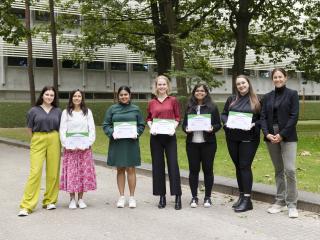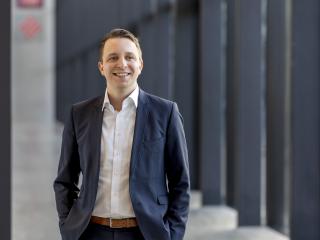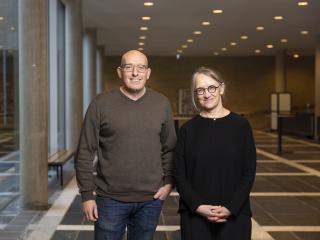International Day of Women and Girls in Science: "This is the moment to pave the way for women in science"
The 11th of February is International Day of Women and Girls in Science, a day established by the United Nations in 2015 to promote gender equality in science and highlight the important role of women and girls in science. After nine years, the continued necessity of this day is evident from the statistics provided by the 2023 Female Professors Monitor (Monitor Vrouwelijke Hoogleraren 2023). The growth in the number of female professors is plateauing. Antoinette de Bont, professor and dean of the Tilburg School of Social & Behavioral Sciences, emphasizes, “It is time for action. We are at a turning point: this is the moment to pave the way for women in science.”
Antoinette de Bont: "The alarm bells continue to ring, notes the National Network of Female Professors (LNVH) at the end of 2023. There is a concerning downward trend in the growth of the percentage of female professors. In 2023, the lowest growth in the past five years was recorded, with the current share at 27.6 percent. While women are overrepresented in lecture halls, pursuing a scientific career path is not a given.
Despite these figures not presenting an optimistic outlook, there are some notable silver linings, like the significant increase in the proportion of female associate professors. Additionally, the anticipated retirement of male professors in the 60+ age category seems to be underway. This paves the way for more women in science. This leaves Universities with a crucial role in making science more attractive to women. It starts with changing the perception; scientists are not just elderly men in white coats working in laboratories. Science is for everyone. The social sciences at our university are relatively successful in terms of the proportion of women, a trajectory that I aim to maintain. We can learn from situations where women are successful. Listening to the stories of women who chose a career in science provides insight into the diversity of the scientific community."
Antoinette de Bont, dean and professor TSB
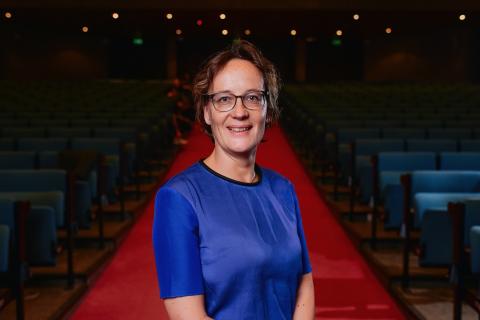
I hope and wish for the next generation of girls and women to be able to let go of the iron rhythm of an academic career. Is it an iron law to have to be promoted as a university lecturer after five years? And professor five years later?
Choosing science
"As a child, I didn't want to become anything. How does one become nothing? That question was a demand for freedom; the freedom to shape my own future. Later, I had the opportunity to study medicine. But I hesitated: did I want to determine my future now? For me, the freedom that comes with being a scientist was an important factor in choosing science. I became a scientist and now lead the Tilburg School of Social & Behavioral Sciences as professor and dean. I enjoyed all the freedom that science offers. I have been able to work all over the world; in the US, Italy and Norway. So, I definitely became something. In fact, I have been able to create a lot. I chose the freedom of the social sciences, a choice I am happy with to this day."
A female role model
"Throughout my career, three women have shown me the way. With Annemarie Mol, Spinoza laureate, I took a long walk for every choice in my career. With Pauline Meurs, former president of the Council for Public Health and Society, I had the opportunity to carry out distinctive projects at the intersection of policy and healthcare research. Simone Buitendijk, president of Leeds University, showed how to lead a university. In my opinion, learning the art is an effective learning style."
A message to the future generation of girls and women about (working in) science
"I hope and wish for the next generation of girls and women to be able to let go of the iron rhythm of an academic career. Is it an iron law to have to be promoted as a university lecturer after five years? And professor five years later? I myself did not meet any deadline. I first wanted to gain experience outside of science and then I wanted time for my girls. In terms of career, I was always late: 7 years as an assistant professor, 8 years as an associate professor. Today I think, I was exactly on time; on my time."
Marike Knoef, dean TiSEM and professor of Economics
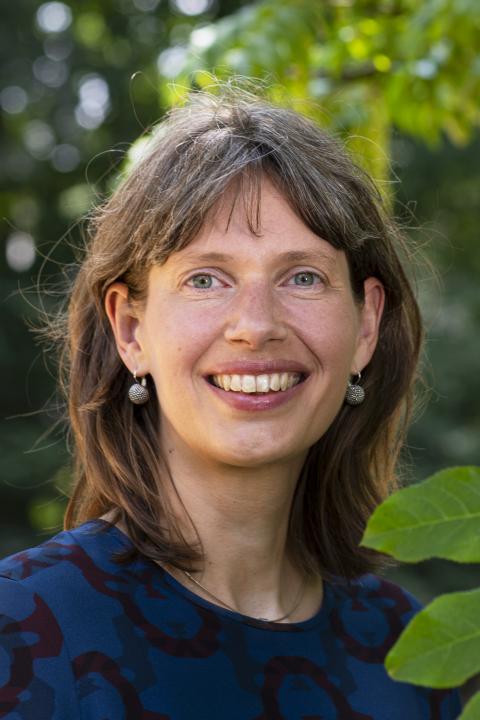
During my studies, I did not have any lectures from female professors or lecturers. There simply weren't any.
Choosing science
"While studying Econometrics, I envisioned contributing to the world after my studies. I decided to write my thesis at the CPB Netherlands Bureau for Economic Policy Analysis. When I was writing the thesis, on women's labor force participation, I came into contact with people who had obtained their PhDs and were engaged in devising new creative research. That really appealed to me, so I decided to pursue a PhD as well. A position opened in the field of pensions at Netspar. It allowed me to do research on a societal relevant topic with a clear link to practice through conversations with pension funds, insurers, and ministries. What I enjoy about research is that you can thoroughly investigate a problem to understand the world a little better. Improving decision-making with the help of knowledge is a major motivation for me."
Female role model
"During my studies, I did not have any female professors or lecturers. There simply weren’t any. The crazy thing is that I didn’t really realize that at the time. I did have role models, but none were female. However, my mother did study when I was young. She spent entire days buried in books. As a child, I found that quite boring, and I said, “I'm never going to study when I grow up.” Well, things turned out differently. I did inherit her eagerness to learn."
Advice for the next generation of girls and women (working) in science
"Make sure you do it your way. The function of a university is broad and involves research, education, impact, and leadership. The idea of a straitjacket with one route to take is a persistent one, but not necessarily always the case. We now have the Recognition & Rewards program, of which diversity within career paths is an important part. That's an important development. This also makes science more attractive to women: What suits you? What makes you happy and what intrinsically motivates you? Choose exactly that."
Emely de Vet, professor and dean University College Tilburg, TSHD
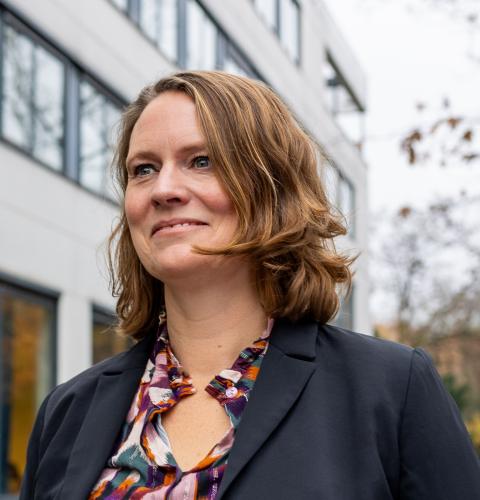
Have a look in different places. Within the same field, different universities can have completely different working environments.
What was your path to science?
"The short answer is that others saw something in me that I didn't see myself. The long answer is a bit more nuanced. I am a first-generation student; the first in the family to attend higher education. When I stated in primary school that I wanted to become a journalist, the teacher said: “Then you must be able to go to HAVO.” I interpreted this as something not in the cards for me. When I was able to go to grammar school, I assumed it would be too difficult. I started studying because Health Sciences seemed very interesting to me: broad, many different perspectives and the possibility to develop in different directions. Although for a long-time university felt like an abstract world where I didn't really belong, a lecturer asked me to become a student assistant in philosophy and health ethics. I helped collect literature and supported in teaching. Later I also supported in research and data collection at the department of epidemiology and biostatistics.
Writing my thesis on organ donation was the real turning point: I enjoyed it so much, I was really driven to figure things out and I did well. When I was asked to do a PhD, I didn't know exactly what it would entail. But as I enjoyed research and teaching, I started a PhD track without really knowing what it would lead to. However, I felt completely at home and was very eager to make the best of it. I found it incredibly educational and challenging. From that position I saw what a career in science could be like. From that moment onwards I knew I wanted to become a professor."
Female role models in science
"I’ve worked in many different places, and at every university and in every role I have come across inspiring women. During my studies, it was a female lecturer in gender studies who had a unique way of teaching. She was able to set out a line of research from her own vision. Later my role models became female professors who, in addition to having a brilliant career, were mothers and were social, approachable, and helpful. Over the years I often encountered colleagues in similar positions - postdocs, UDs, UHDs, professors - who inspired me. What these women often have in common is a certain authenticity and individuality, and a lot of courage to do things differently or to break patterns and structures."
Advice for the next generation of girls and women (working) in science
"Have a look in different places. Within the same field, different universities can have completely diverse working environments. But even within the same university, things can be different across distinct faculties and departments. Academic traditions differ per discipline and organization and the roles you fulfill in the same position can also be very different. I try to encourage my students and PhD students to do internships, go on an international exchange for a while, or do a postdoc in a new place or in a different discipline than the initial program. It provides inspiration and insight if you know how to surround yourself with people who have differing knowledge and skills. So don't focus too much on obtaining that permanent position at that one university, but dare to choose uncertainty and explore other options. Above all, follow your own path, find what suits you, don't be afraid to change course or make choices that are not immediately obvious. Don't allow yourself to be told that you can't do something and continue to follow your own curiosity so that you continue to learn and develop."
Tila Pronk, Associate Professor, TSB
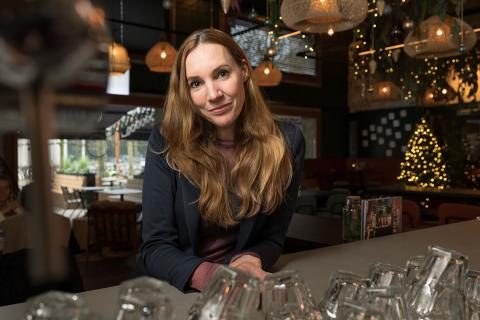
As long as you are curious and have a passion for a particular subject, then science can be for you
Choosing science
"In my experience, I never consciously chose a career in science. As a young girl, I had absolutely no idea that science would suit me: it seemed stuffy, boring, and far too difficult. Despite this, I have always been fascinated by human behavior, especially relationships between people. When I found out you could study that with psychology, my choice was quickly made. After my studies, I had the feeling that I had not yet finished learning. I was still very curious and I wanted to share the knowledge I was gaining with others. It was not until a few years ago that I learned that these are exactly the characteristics of a scientist: curiosity for new knowledge, and a passion to share that knowledge. Now I feel completely at home at the university. Finally, you might say."
A female role model
"An important role model for me was Prof. Caryl Rusbult. She was one of the founders of relationship research, a big name in my field. I still remember how starstruck I was when I was taught by her during my Research Master's degree at VU Amsterdam. To my great surprise, she turned out to be very approachable, warm, and so nice. Her personal approach has been a huge inspiration to me as a teacher. Unfortunately, Caryl died of cervical cancer shortly after my graduation, at the age of 57."
An advice to the next generation of girls and women about (working in) science?
"I think it is very important to broaden the image of the 'classic scientist'. There are so many different scientists, with so many distinct talents. As long as you are curious and have a passion for a particular subject, then science can be for you!
I also think it is important that children are introduced to science and the university at an early age. I invest in that, for example by giving a lecture for JuniorUniversity as part of Tilburg University Junior, or at my sons' elementary school. It's great to see children getting excited about science!"
Nadine Groeneveld-Tijssens, professor TLS
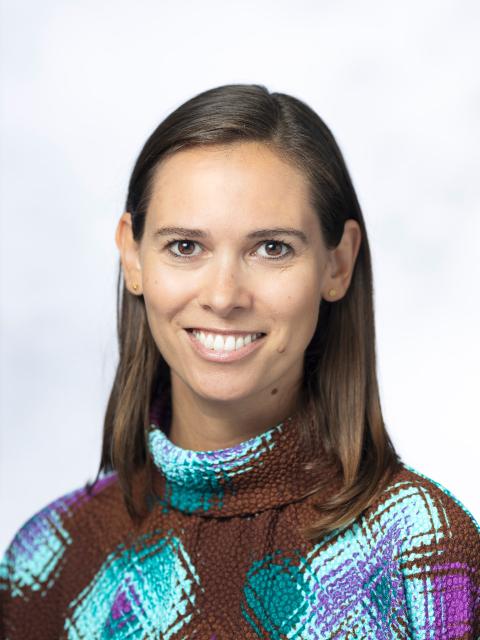
For all young people considering a career in science, I think it is good not to be too modest and to try to publish something while you are still a student
Choosing science
"Even as a student, I felt involved in education and research. In my third year, I tutored students as a "tutor" and then worked as a student assistant in the private law department at Tilburg University. Nevertheless, after graduating, I started working in practice as a trainee lawyer. When six months later I won the thesis award for my thesis (published in a scientific journal), that was a push for me to start combining practice with science. I started working on a dissertation as an outside doctoral student two days a week and the other three days I worked in practice as an attorney intern. This combination suited me well from day one, and in this way I still practice science alongside practice, but now as an associate professor of Appellate Law in addition to my job as a cassation lawyer at AKD."
A female role model
"There are of course many people who have inspired me and still inspire me in all kinds of areas, but I have not had one specific role model."
A message to the future generation of girls and women about (working in) science
"For all young people considering a career in science, I think it is good not to be too modest and to try to publish something while you are still a student. Then you will naturally experience whether you get energy from doing research."
Date of publication: 2 February 2024

